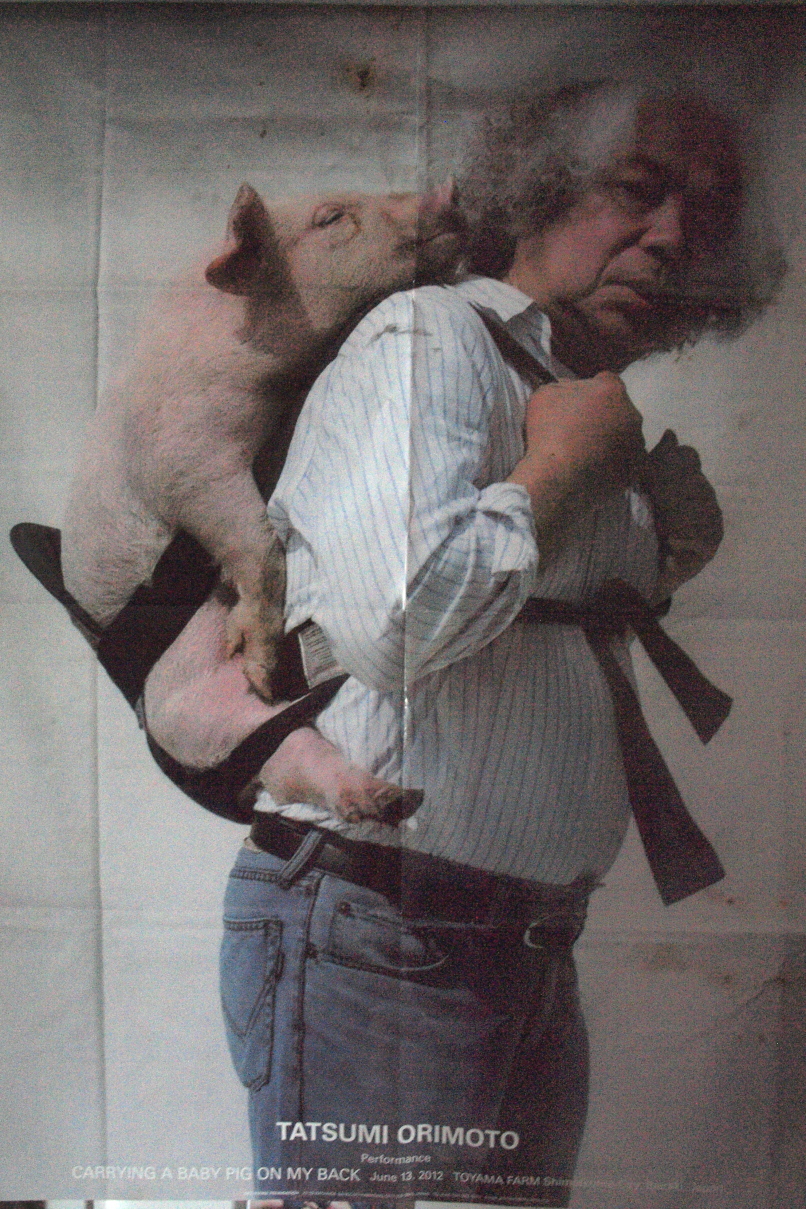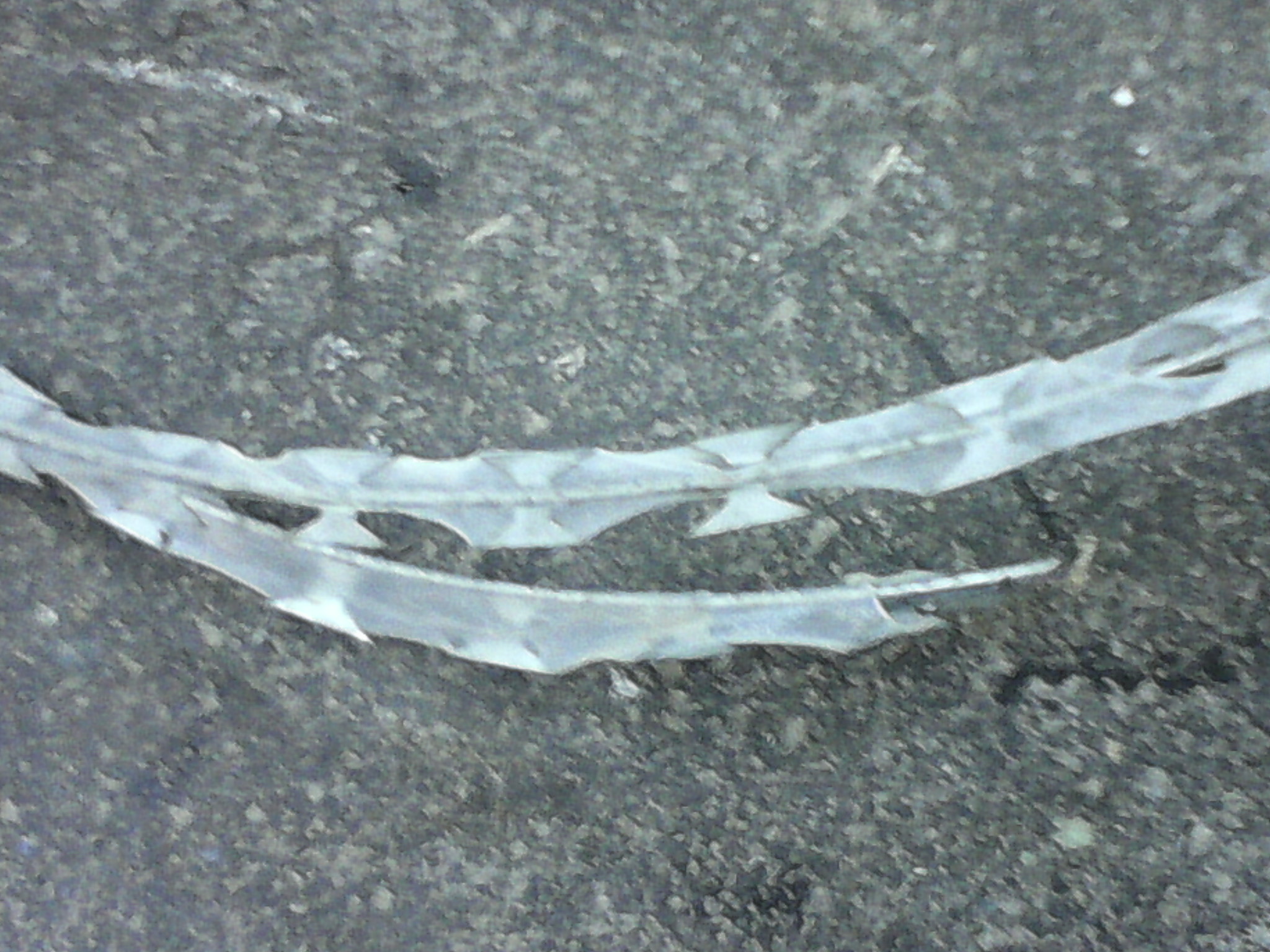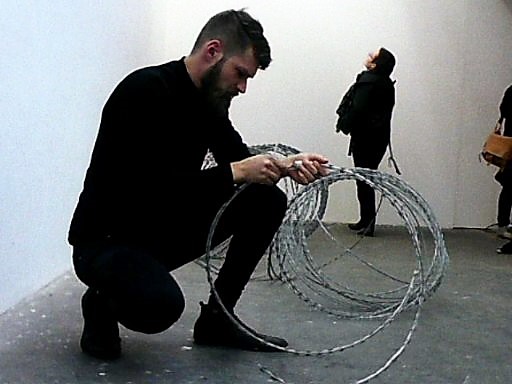Es ist keine Neuigkeit dass der Aufbruch in den Künsten seit den 1960 Jahren nicht nur Bühnenbildner in die Museen geholt hat, sondern auch die Spezialisierung von Autoren mit interdisziplinären Fertigkeiten nach Orten der Präsentation verlangt, die Theater nicht bieten können, hingegen werden in Off-Räume und Kunstinstitutionen, die sich diesen Feldern geöffnet haben, neue Erfahrungen für alle Beteiligten möglich. Die GAK in Bremen setzt sich mit solchen Positionen auseinander. Noch bis zum 25. Februar 2018 zeigt Than Hussein Clark „The Director’s Theatre Writer’s Theatre“ Umgekehrt haben bildende Künstler Video als ihr Medium definiert und auf das Wissen der Filmindustrie gesetzt sowie mit Theater experimentiert. Dadurch konnten sich eminent erfolgreiche Installationskünstler wie Bruce Nauman und Paul McCarthy entwickeln.
Horror der Existenz und Existenzbeweise
Ganz andere weniger Raum greifende und dennoch eindringliche Werke aus einer Privatsammlung präsentiert die Weserburg auf dem Teerhof gegenüber noch bis Ende März 2018 (verlängert!). Schon der Titel „Proof of Life“ lässt aufhorchen und erfüllt auch noch die geweckten Erwartungen. Die Ausstellung versammelt 76 Werke von Künstlern, die die Expansion der Künste gut beobachtet haben und ihre Konsequenzen als Maler, Bildhauer und Fotografen daraus gezogen haben. Sie vergegenwärtigen die Grenzsituationen, wie sie von Performer in ihren besten Zeiten erforscht worden sind, und fixieren sie. Es ist vielleicht vermessen, das so eindeutig zu behaupten, doch liegt die Stärke dieser Sammlung in der Ballung von Werken, die sich so wie sie gehängt sind noch gegenseitig steigern. Der existenzialistische Druck, in den uns die Ereignisse und Brüche der letzten 100 Jahre in Europa und den USA bei durchweg guten materiellen Bedingungen geführt haben, wird transportiert. Es scheint, dass der Überfluss erst die Fähigkeit und die Mittel erzeugt hat, derartige Forschungen zu betreiben und zugleich die Konzentration deutlich macht, mit der wir als Europäer bestimmte Phänomene immer wieder neu zu erfassen und zu interpretieren zu versuchen. Mit der Bibel haben wir uns den Turmbau zu Babel als Erzählung der menschlichen Hybris angeeignet, die die Menschen in den Abgrund reißt. Jake & Dinos Chapman haben mit Tower of Babbel ein Miniaturmodell mit Tausenden von sich lustvoll gegenseitig abschlachtenden Nazis gebaut, in dem sich Uniformierte, Behelmte und Verwundete mit Clownsfiguren vermischt, die den Totentanz anscheinend organisiert haben, den sie auf einem provisorischen Holzturm fortsetzen, von wo sie den Leichenhaufen kontinuierlich erhöhen. In dieser von einer Apokalypse gezeichneten Landschaft kann der Turm nicht einmal mehr ein Mahnmal sein. Keiner mehr wird es anschauen können …
Bilder, Objekte, Skulpturen, Installationen, Fotos und mehr in ähnlicher Qualität von folgenden Künstlern haben weitere Aspekte so zugespitzt, dass man die aktuellen Themen nicht unbedingt vermissen muss. Es sind:
Hilary Berseth, Louise Bourgeois, Berlinde de Bruyckere, Patrick van Caeckenbergh, Jake & Dinos Chapman, George Condo, Anton Corbijn, Thierry de Cordier, Danny Devos, Tracey Emin, Tom Friedman, Line Gulsett, Damien Hirst, Roni Horn, Thomas Houseago, John Isaacs, Sergej Jensen, Nadav Kander, Anne-Mie van Kerckhoven, Anselm Kiefer, Esther Kläs, Wolfe von Lenkiewicz, Alastair Mackie, Christian Marclay, Kate MccGwire, Richard Prince, Leopold Rabus, Daniel Richter, Terry Rodgers, Sterling Ruby, Richard Serra, Andres Serrano, Stephen Shanabrook, Mircea Suciu, Gavin Turk, Jonathan Wateridge.
Was bedeutet Theatralität?
Die Frage, warum und wodurch die Theatralik in der bildenden Kunst so bedeutend geworden ist, muss dann gar nicht mehr auf die GAK beschränkt bleiben. Ihre Leiterin Janneke de Vries hatte jedenfalls Jörn Schafaff aus Berlin eingeladen, um über dieses Thema zu referieren. Anhand der Praxis von Rirkit Tiravanija wurde deutlich, dass zumindest bei isoliert gezeigten Objekten und Situationen in Ausstellungsräumen ein Distanzierungseffekt auftritt, der die Einstellung des Publikums zu Nachstellungen privater Räume und Mitteilung intimer Erfahrungen verändert. Die erhöhte Aufmerksamkeit ermöglicht ein „erfahrungsbasiertes Verstehen“. Aus der theoretischen Diskussion ist die Kritik Michael Frieds mitzunehmen, die sich gegen die minimalistischen Objekte (Collum, 1961) und ihre Arrangements im Raum von Robert Morris richtete. Doch sind diese Objekte theatralisch? Morris versuchte sie ja durchaus durch Interventionen in Bewegung zu bringen oder gar umzuwerfen, was dazu führte, dass sowohl Allan Kaprow 1963 in „Push and Pull. A Furniture Commedy for Hans Hoffmann“ wie auch Chris Burden mit „Sculpture in Three Parts“ (10. bis 12. September 1974) darauf Bezug nahmen. Burden benutzte eine Säule als Platz für einen Stuhl, auf dem er so lange saß, bis er sich nicht mehr halten konnte und abstürzte, und Kaprow machte die Möbel durch Umrücken zu Akteuren, die zugleich auf Hoffmann als den Maler anspielten, von dem er als sein Assistent auch lernte, sich den Weg zum Happening zu bahnen. Beide Künstler distanzierten sich durch ihre Aktionen sowohl vom Minimalismus glatter und polierter Objekte wie auch von einem bis heute gepflegten akademischen Verständnis der Theatralität. Dadurch gelangten sie zu einer Darstellungsform, der nicht nur eine künstlerische Demonstration gelang, sondern diese auch in Richtung einer Stellungnahme zu erweitern, die geeignet ist sich in akademische Diskurse einzumischen. In den 1970ern wurden also nicht nur Bilder Worte (Bilder werden Worte hieß 1977 die Dissertation von W.M.Faust), sondern auch Installationen und Performances erwiesen sich als geeignet, auf Basis der aktuellen Diskurse aktionistisch Argumente vorzutragen.



